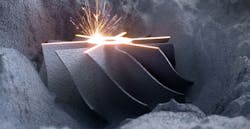QuesTek Develops High-Performance Stainless for AM
QuesTek Innovations LLC reports it developed a new stainless steel composition for powder-bed fusion additive manufacturing, for use in the as-printed condition or with a single, low-temperature heat treatment. It noted that the new powder metal will allow 3D-printing of complex, high-strength stainless parts, comparable to wrought 17-4 PH, but without the need for cryogenic processing or high-temperature heat treatment.
The alloy has a wide range of applications, including aerospace, defense, medical, chemical processing and energy markets.
QuesTek is Integrated Computational Materials Engineering (ICME) enterprise. Its materials design efforts have been responsible for a family of commercially available Ferrium® steels, in use for various demanding applications.
The available 17-4 steel commonly used in AM often requires a high-cost, argon-atomized powder, in order to avoid retained austenite issues, and QuesTek noted it yields poor properties. However, it added, even properties of argon-atomized 17-4 properties are inconsistent and sensitive to the feedstock composition.
“With QuesTek’s QT 17-4 powders, a fully martensitic microstructure is achieved in the as-printed condition," according to Dr. Dana Frankel, QuesTek manager of design and product development. "The high-temperature, solution heat treatment process required for conventional 17-4 is not needed for QuesTek’s alloys, and the resulting properties have less variation.”
Two feedstock options are available: QT 17-4 for use in the direct-aged condition; and QT 17-4+ for use in the as-printed condition. The corrosion-resistance and fatigue performance of both designed AM alloys is equivalent or improved over AM material printed using commercially available 17-4 powders, the developer claimed.
While the initial development of QT 17-4 was focused on powder-bed AM process, QuesTek plans to demonstrate it in wire-based AM, which will allow production of larger components.
QuesTek is in discussions with commercialization partners, including alloy producers, metal AM machine manufacturers, and service bureaus to license the new alloy, to accelerate commercial adoption.
